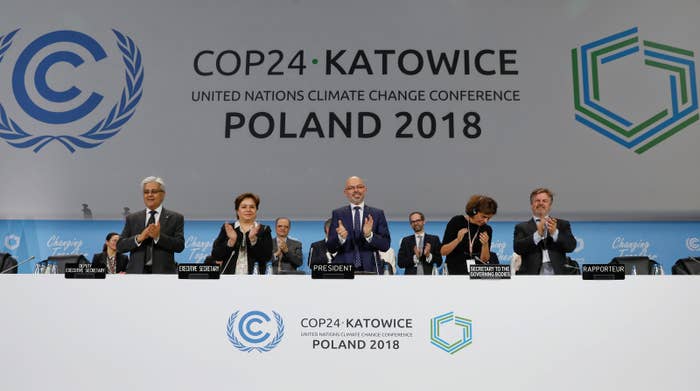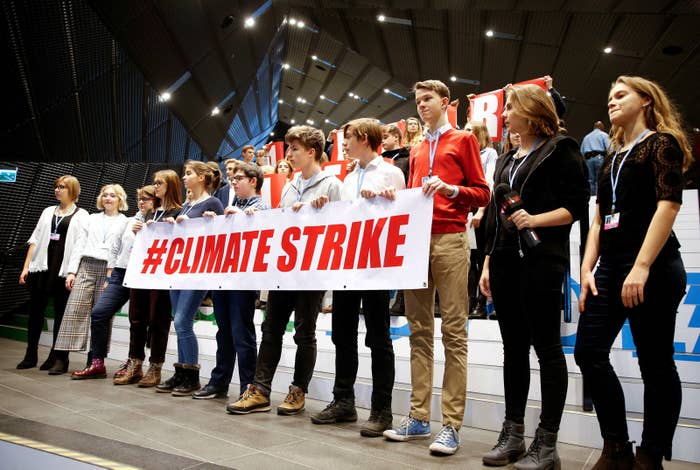
Diplomats struck a late-night deal on Saturday outlining how the world will push forward on plans to stave off catastrophic climate change, closing out two weeks of intense negotiations in Poland.
The main achievement of the COP24 — the 24th Conference of the Parties to the United Nations Framework Convention on Climate Change — was the reaffirmation of some 200 countries to their commitment to the Paris climate agreement signed three years ago, finalizing the rules that will set the historic 2015 accord in motion.
Reactions to the outcome of COP24 were split, with some celebrating it as a sign that countries are leaning into the global climate agreement even as President Donald Trump has pledged to withdraw the US, the world's second-largest emitter of greenhouse gases, from the accord.
“This is an excellent achievement!” Patricia Espinosa, the United Nations’ climate chief, said in a statement. “This is a road map for the international community to decisively address climate change.”
“They did almost everything they set out to do,” Jonathan Pershing, a former top US climate negotiator under President Barack Obama, told BuzzFeed News. “It’s a good outcome.”
Not everyone shared this optimism. But others have said that not enough progress was made in Poland considering recent research that shows the world has just a few decades to prevent devastating climate impacts.
“In Katowice, world leaders failed to adequately address the needs of people suffering from climate change right now, including small island nations and even some US communities who face existential threats,” Rachel Cleetus, a climate policy expert and economist at the Union of Concerned Scientists, said in a statement.
Thousands of country officials, activists, business leaders had gathered in Poland’s coal country this month for the annual climate summit. Countries squeezed out an agreement on rules for how to track their climate progress over the years, and committed to reviewing and likely increasing their climate action over time and helping pay for the world’s poorest and most vulnerable nations respond to looming climate crises.
There were some notable hiccups. For one, countries could not resolve all of their differences, and some discussions about the rules for implementing the Paris agreement, including those for how to set up global market systems to help cut the cost of reducing emissions, have been punted to a future round of talks.
“Unfortunately, in the end, the differences could not be overcome,” Espinosa said of the discussions on market systems.
Another flashpoint was how to deal with the findings of the Intergovernmental Panel on Climate Change’s special report published in October, which found the expected impacts of 1.5 degrees Celsius of warming are worse than expected — and that the world has less time to act than previously thought.
Four big fossil fuel–producing countries — the United States, Russia, Kuwait, and Saudi Arabia — banded together to block language “welcoming” the special report. Softer language recognizing the report was included in the meeting’s final agreement text.
On the issues of climate science and the need for urgent climate action, “that’s where the text falls down a little bit,” Camilla Born, a senior policy adviser in climate diplomacy at the sustainability group E3G, told BuzzFeed News.
"It was beyond disappointing that all countries were not able to welcome the IPCC report on 1.5°C here in Katowice,” Gebru Endalew, chair of the Least Developed Countries Group negotiating block, said in a statement. “We cannot ignore its findings, and we absolutely must not ignore its recommendations.”
“The text gained and lost things in the final day, which is typical in this process,” Lou Leonard, a senior vice president at the World Wildlife Fund, told BuzzFeed News in an email. “Although you always hate to lose good provisions, the final rulebook is still better than where we were at the beginning of the week, albeit not as strong as it could be.”

The US disrupted the climate talks in ways beyond the special climate report discussion. For example, last week, the country led a pro–fossil fuel event on the sidelines of the talks. Protesters disrupted the event.
According to Pershing, the resulting impacts were minor. The bigger problem with the Trump administration's US team at the talks is that “they are disengaged,” he said, and failed to offer political muscle to help move the talks forward when COP24 discussions hit road bumps.
The State Department issued a statement after the conclusion of the summit Saturday saying the US position on the Paris agreement is unchanged and “[t]he United States is not taking on any burdens or financial pledges in support of the Paris Agreement and will not allow climate agreements to be used as a vehicle to redistribute wealth.”
Looking beyond this summit, climate experts said, the challenge moving forward will be getting countries to more deeply cut their carbon pollution.
“I think there’s going to be a reckoning next year,” Samantha Gross, a fellow in the Cross-Brookings Initiative on Energy and Climate, told BuzzFeed News. Countries not only need to ramp up their climate goals, she said, they need to figure out how to meet the ones they’ve already set. A recent UN report found even if countries met all their climate pledges, the world would be on track to warm beyond 2 degrees Celsius.
“One of the things that is so discouraging is how big a problem we got,” Pershing said. “And we are not moving fast enough. We have to do more.”
CORRECTION
The Paris accord was signed in 2015. An earlier version of this post misstated the year.
